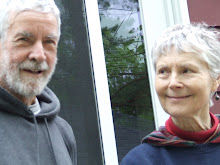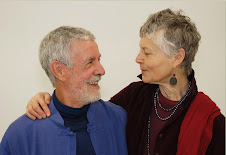Poems
Forged in Grief Echo A Formidable Love
“A poem begins
with a lump in the throat,” wrote Robert Frost. And anyone who reads
Elaine G. McGillicuddy’s first volume of poems, Sing to Me and I Will Hear You –
The Poems is bound to share
the truth of Frost’s observation. McGillicuddy, of Portland, ME, lost her
husband Francis to cancer on Jan. 3, 2010. He was 82 and they had been
married for forty years.
Their love story
is particularly poignant because, when they first met, she was an Ursuline nun
and he was a diocesan priest. They shared a commitment to the peace
movement during the Vietnam war. Their mutual devotion led them to marry
and pursue together interests in yoga, Pax Christi, war tax resistance,
permaculture, the Dances of Universal Peace, and membership in CORPUS.
The reader meets
the McGillicuddys on the cover of Sing
to Me. All the poems can be considered a commentary on what is
revealed by that portrait. The faces of husband and wife reflect the
unrestrained joy of mated souls saturated with love for each other, for life,
and for its Source.
Poet Jane
Hirschfield points out that poetry “is based on a thoroughly lived life.”
Elaine McGillicuddy did not become a poet until her 75th year. But her
writing draws on the deepest of wells, a life and a love thoroughly
lived. She wrote these 65 poems because she needed “a reason to go on
living.” They are the fruit of her daily contemplative prayer or “sitting
practice” which she does wrapped in her husband’s shroud as a prayer shawl.
Reading them will be a healing experience for bereaved widows and widowers,
friends and kin.
One of
McGillicuddy’s most affecting poems reveals the origins of her memorable
title. “Duet” begins with Francis’ words to his wife when he knew that he
would not survive the excruciatingly painful bone cancer: “As death
approaches me, . . ./even if I seem beyond your reach,/sing to me and I will
hear you.” She did. And she knew that he did.
In the poem’s
second movement, McGillicuddy celebrates her husband’s transformed presence
which she experiences as right here, right now. She knows that Francis
lives on. “When Great Mystery beckoned, you entered Her depths,/ but left
the door ajar for me./Now I can hear you sing!”
McGillicuddy’s
narrative poems draw us into the small case events of a widow’s daily life
where familiar settings have the power to wound or hearten. “Big Love”
recounts a seemingly minor incident wherein the poet is driving home from a
visit to her chiropractor a few months after Francis’ death. She suddenly
remembers how he would say, “Drive carefully.”/(revealing love’s
concern).”
The remembrance of
her husband’s voice, emblematic of his manly protectiveness, makes
McGillicuddy’s heart swell with the recognition of “so much love/I was
surprised,/said out loud, still driving - /”It’s big! IT”S BIG – YOUR
LOVE!” Her profound perception assures the reader that love not only does
not die after a loved one’s death, neither is it diminished. It expands.
The lyrical and
alliterative “The Tang” compares the McGillicuddys’ wedded life to a “dance all
these years,/its rhythm and beat pulses now in my life/with such force/I can
feel both your hand and your step.” The poem closes with this
telling stanza: “We’re still moving together/though the melody’s
new.”
Several poems in
this volume incorporate actual dialogue from the closing months of Francis
McGillicuddy’s life, as his wife kept a journal to store up his precious
words. One of the most memorable is “Whoever Heard” in which a hospice
nurse at the home patient’s bedside asks him, “What’s holding you back?”/”It’s
the joy,” you said.”
A few of the poems
are spiced with welcome humor. In “Hospital Walk,” McGillicuddy recalls
how her husband demonstrated a squat to a surprised physical therapist and
impishly proclaimed, “It’s yoga.” In “Two Firsts,” the poet connects
Francis’ first radiation treatment with another first. She boasts to the
therapist that “this man of mine,/20 years ago/at 62/kicked up/into his very
first-ever/handstand.” (To those who knew him, this image of the lanky
patient upended is delightful.)
Although most of
the poems are focused entirely on husband and wife, “He Stood On Our Ladder”
broadens the poet’s perspective and reminds us of both the McGillicuddys’
global concerns. The “he” of the title is an African youth who had fled
persecution in Burundi. The poet has hired him to pick peaches, while she
gathers the fallen fruit on the ground. He tells her his sad story yet
breaks into song as he enjoys the beauty of the day.
The poet wonders
if her husband, through his “loving communion” with her, continues to grow as
she does in her new solitary life. She realizes that he is with the
Source of life and can have nothing further to gain. But she concludes
with these lines: “Yet remembering/this Wellspring, our God, counts/”the
very hairs on (our) heads,”/I know/that you grow when I do.”
Readers of this
love-soaked volume will likewise grow through their exposure to a rare
relationship between two graced souls destined to share a formidable
love. In their 40 years of marriage, the McGillicuddys gathered around
them a widening community of peacemakers, earth-stewards, and
justice-doers. They enriched the world as they found it.
I once visited a
Unitarian-Universalist church in Portsmouth, NH where the co-pastors were a
married couple whose gifts visibly complemented one another. Remembering
that holy and wholly human man and wife, I see in Elaine and Francis
McGillicuddy what the Catholic Church deprived itself of by saying no to
married priests.
Sing To Me And
I Will Hear You is a beautiful book. Read it and be lifted up by the
company of two priests, one on either side of the thin place separating this
material world from the everlasting City of God. For, as Wallace Stevens
observed, “The poet is the priest of the invisible.”
(Gloria Hutchinson
is an author whose latest book is Glimmers
of God Everywhere: Catching Sight of the Daily Divine soon to be available from amazon.com.
She lives in Bangor, ME.)


















No comments:
Post a Comment